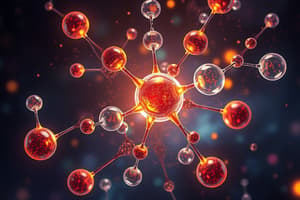Podcast
Questions and Answers
What is the main purpose of filtration in practical organic chemistry?
What is the main purpose of filtration in practical organic chemistry?
- To convert solid particles into a solution.
- To increase the concentration of the solution.
- To remove liquid impurities from a solution.
- To collect desired solid from the solution. (correct)
Which filtration technique allows gravity to draw the liquid through the paper?
Which filtration technique allows gravity to draw the liquid through the paper?
- Vacuum Filtration
- Centrifugal Filtration
- Filter Cone (correct)
- Fluted Filter
Why do undissolved solid particles remain on the filter paper during filtration?
Why do undissolved solid particles remain on the filter paper during filtration?
- Due to their magnetic properties attracting them to the filter paper.
- Due to their smooth surface preventing passage through the filter paper.
- Due to their size being smaller than the tortuous channel of the filter.
- Due to their size being bigger than the tortuous channel of the filter. (correct)
Which type of filtration is used for removing solid impurities from a solution?
Which type of filtration is used for removing solid impurities from a solution?
What is the purpose of a fluted filter in practical organic chemistry?
What is the purpose of a fluted filter in practical organic chemistry?
What are the two main purposes of filtration in practical organic chemistry?
What are the two main purposes of filtration in practical organic chemistry?
Explain the difference between filter cone and fluted filter in gravity filtration.
Explain the difference between filter cone and fluted filter in gravity filtration.
What is the purpose of vacuum filtration in practical organic chemistry?
What is the purpose of vacuum filtration in practical organic chemistry?
How does filtration contribute to the purification of a solution in practical organic chemistry?
How does filtration contribute to the purification of a solution in practical organic chemistry?
Why do undissolved solid particles remain on the filter paper during the filtration process?
Why do undissolved solid particles remain on the filter paper during the filtration process?
What is the main purpose of filtration in practical organic chemistry?
What is the main purpose of filtration in practical organic chemistry?
What are the two main types of filtration for macroscale?
What are the two main types of filtration for macroscale?
What is the technique used for collecting desired solid from the solution in filtration?
What is the technique used for collecting desired solid from the solution in filtration?
What is the purpose of vacuum filtration in practical organic chemistry?
What is the purpose of vacuum filtration in practical organic chemistry?
Why do undissolved solid particles remain on the filter paper during filtration?
Why do undissolved solid particles remain on the filter paper during filtration?
Flashcards are hidden until you start studying




